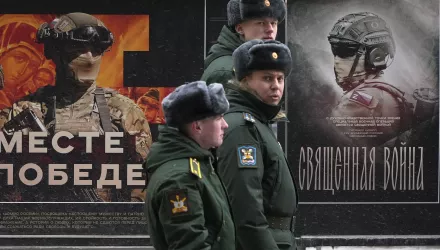The beginning of East-West conventional arms talks in Vienna represents another window of opportunity for stabilizing a relationship between the two superpowers beyond the Cold War. If not the Cold War, what? What relationship between the superpowers is both desirable and feasible?
A six-year collaboration between Harvard's John F. Kennedy School of Government and the Soviet Academy of Sciences has sought to identify lessons learned in avoiding war over the last 40 years. In a joint statement last month, these American and Soviet academics and policy advisers agreed on a guiding concept for the U.S.-Soviet relationship in the coming decades: sustainable peaceful competition. In such a relationship, competition would be regularized and demilitarized: We would cooperate where our interests are shared, compete in areas of values without the threat of war.
The objective foundation for sustainable peaceful competition has emerged in practice. These guidelines should be recognized, respected and extended. They include:
Realism and common sense: If war between the U.S. and USSR would destroy both, what follows? A simple, common-sensical approach to constrain those dimensions of competition that risk war. Both former President Reagan and President Mikhail Gorbachev have acknowledged that a "nuclear war cannot be won and must therefore never be fought." However simple such truths, they have long eluded leaders of both governments. No change has been more dramatic than the erosion of ideology and dogma - in both leaderships - toward realism and common sense.
Mutual recognition: The U.S. and Soviet Union must recognize each other as sovereign states with legitimate governments; as nations that have equal rights; as co-equal great powers (at least in the military dimension) which therefore shoulder a special responsibility. Recognition of "equality" and "equal security" does not mean denying fundamental differences in moral and political values. Rather, as in domestic law, equality recognizes each party's independence, rights and capacity to make unilateral choices in its own realm, and to reject the terms of any agreement it judges contrary to its sovereign interests.
Regular communication and consultation: Traditional diplomatic channels of communication have been expanded by upgraded hot lines between heads of state and regular summits that foster mutual understanding of views, hopes and fears. Regular meetings between heads of state and even more frequent discussions among secretaries of state, secretaries of defense, military chiefs and lower levels will help to clarify vital interests, reinforce a common understanding of constraints and permit the identification of issues on which parallel action or agreements can advance the interests of both parties.
Negotiation of agreements case by case: Negotiations should be conducted in a businesslike way that advances each party's concept of its own interests. Arms control will remain at the top of the agenda because preventing nuclear war is the overriding common interest. Steady steps to reduce risks help build a peaceful relationship in other dimensions. Agreements to limit regional conflicts, permit trade and investments and allow greater scientific, technical, cultural and human exchange will permit each side to realize more of its own interests.
Establishment of institutions and procedures to make agreements operational: Bilateral institutions and procedures such as the Standing Consultative Commission and Nuclear Risk Reduction Centers in Washington and Moscow provide mechanisms for interpreting and enforcing agreements. Multilateral institutions and procedures, such as the Conference on Security and Cooperation in Europe, International Atomic Energy Agency for nonproliferation, or the UN Security Council with its peace-keeping function, can often be even more effective in settings that engage the independent interests of many sovereign states.
Respect for human rights at home and abroad: Building on the UN Charter, the Universal Declaration of Human Rights and the Helsinki Final Act, further efforts to improve human rights without exaggerated publicity or propaganda will contribute to a sustainable relationship. While the links between freedom for citizens at home and the prospects for a peaceful U.S.-Soviet relationship are subtle, they are real and powerful. Greater freedom at home engenders greater trust abroad not only by increasing transparency but also by demonstrating consistency between declarations and behavior.
Regularized U.S.-Soviet competition would constrain forces that threaten war and channel superpower energies toward joint gains and cooperation. Agreements, institutions and procedures must be developed to minimize the possibility that competition could lead to war. Current talks in Vienna provide an appropriate forum for achieving such objectives.
In other areas, competition between values and views of the two societies can be productive - spurring each to more vigor and creativity than either would otherwise muster. Which political and economic system can better met the needs of its own population? Which will better realize cultural and spiritual aspirations? Which model will attract the hearts and minds of other citizens of the world? Answers to these questions should be left to the competition and determined by the results.
Allison, Graham. “If Not the Cold War, Then What?.” Chicago Tribune, March 15, 1989



